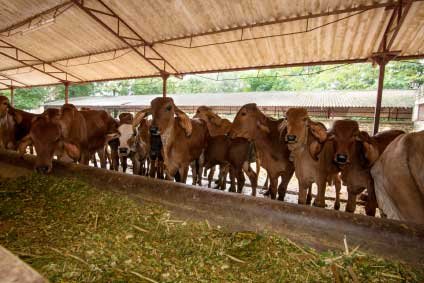© 2026 Sri Varalakshmi Charitable Trust (R) Uppunda
BUILDING HOPE, CHANGING LIVES ACROSS COASTAL AND URBAN COMMUNITIES
Govardhana Gaushala
GOVARDHANA GAUSHALA
Nurturing Our Sacred Cows

In Hinduism, the cow is considered a sacred animal and symbolizes wealth, strength, and motherly love. It is believed to be the earthly representative of the divine and nourishing Mother Goddess, who represents fertility and bountifulness. Their milk is believed to have a purifying effect on human bodies. A Gaushala is vital in India for various reasons. Firstly, it upholds the cultural and religious significance of cows, which are revered in Hinduism as sacred animals. Beyond spiritual beliefs, Gaushala provide a safe haven for cows, protecting them from neglect and abuse while fostering compassion towards animals. Moreover, these shelters play a crucial role in environmental sustainability by managing cow dung for fertilizers and biogas, contributing to waste management and renewable energy. Economically, Gaushala offer avenues for income generation through the sale of dairy products and organic fertilizers.
Cattle slaughter in India, especially cow slaughter, is controversial because of cattle's status as endeared and respected living beings to adherents of Dharmic religions like Hinduism, Jainism, Buddhism and Sikhism while being an acceptable source of meat for Muslims, Christians and Jews. Cow slaughter has been shunned for a number of reasons, specifically because of the cow's association with the god Krishna in Hinduism, and because cattle have been an integral part of rural livelihoods as an economic necessity. Cattle slaughter has also been opposed by various Indian religions because of the ethical principle of Ahimsa (non-violence) and the belief in the unity of all life. Legislation against cattle slaughter is in place throughout most states and territories of India.
The Sri Varalakshmi Charitable Trust's plan to construct a Gaushala in Byndoor taluk, despite existing facilities in the area, underscores their commitment to animal welfare and community service. By offering advanced facilities free of cost, the trust aims to elevate the standard of care for cows while alleviating the financial burden on local residents. This initiative not only demonstrates a deep sense of compassion towards animals but also promotes sustainability and environmental consciousness through the proper management of resources like cow dung and urine. Moreover, the trust's endeavor serves as a beacon of inspiration, encouraging others to prioritize the well-being of cows and contribute to the welfare of their communities.

